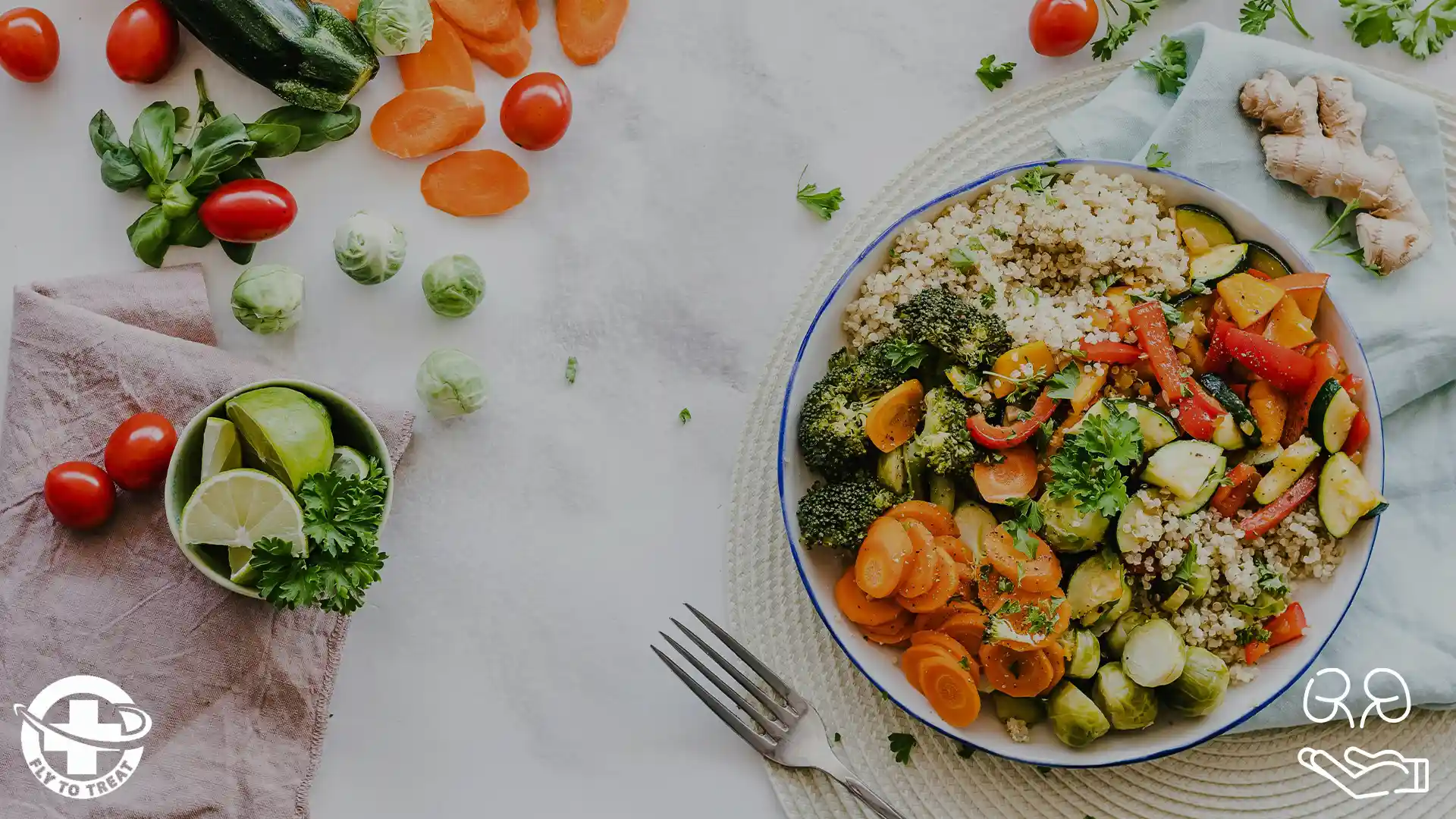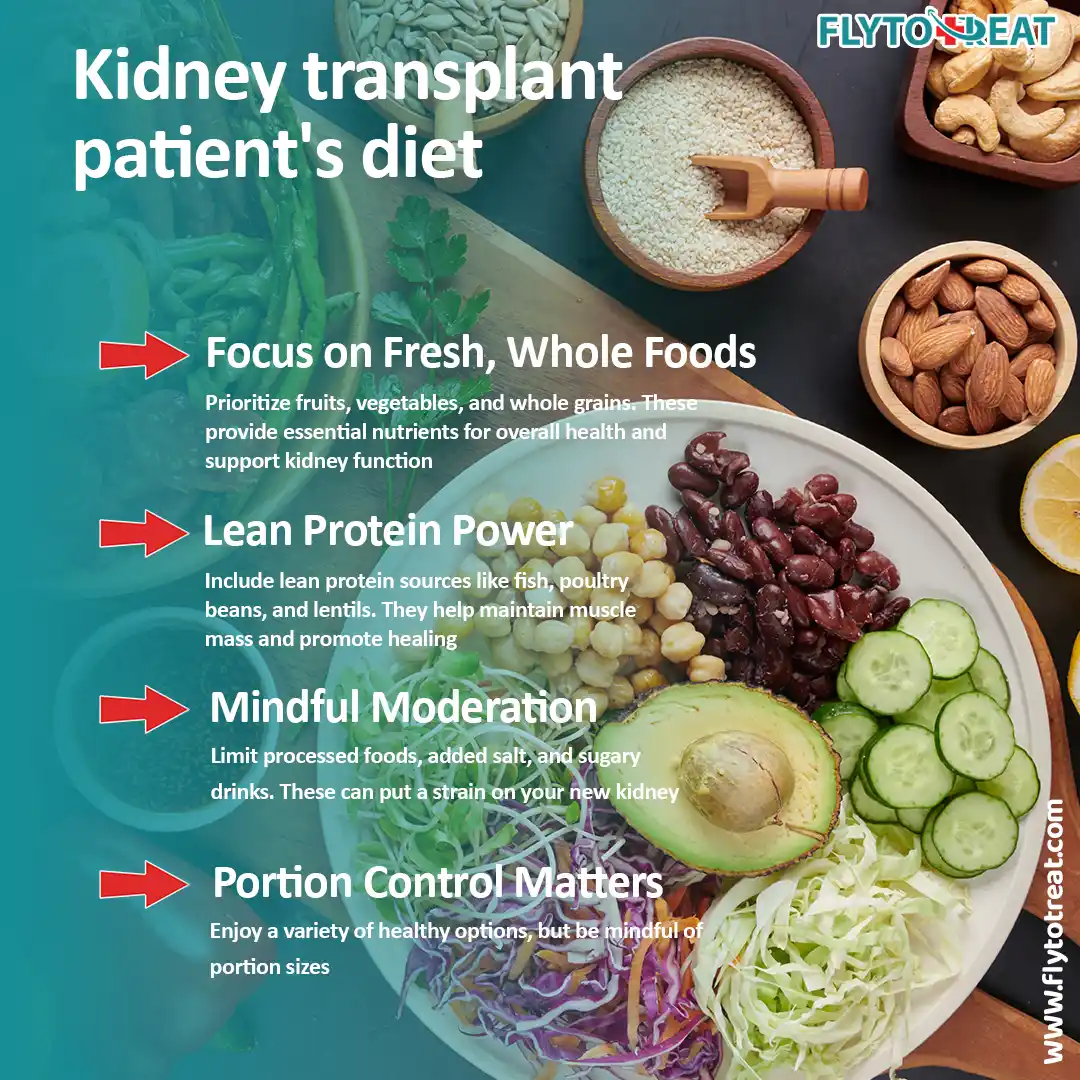
What is the best diet for kidney transplant patients?
Adhering to a kidney transplant diet plan is crucial for maintaining the health of a new kidney and ensuring the long-term success of the transplant. FlyToTreat provides vital information to help navigate dietary changes post-transplant, addressing questions such as "How to keep a transplanted kidney healthy?", "What is the best diet for kidney transplant patients?", and "What to avoid after a kidney transplant?"
What is the best diet for kidney transplant patients?
After a successful kidney transplant, a healthy diet becomes even more important. Here's a look at some key principles for a kidney transplant diet plan:
• Focus on Fresh, Whole Foods: Prioritize fruits, vegetables, and whole grains. These provide essential nutrients for overall health and support kidney function.
• Lean Protein Power: Include lean protein sources like fish, poultry, beans, and lentils. They help maintain muscle mass and promote healing.
• Mindful Moderation: Limit processed foods, added salt, and sugary drinks. These can put a strain on your new kidney. Opt for fresh, whole foods whenever possible.
• Portion Control Matters: Enjoy a variety of healthy options, but be mindful of portion sizes. This helps manage weight and blood pressure, both crucial for kidney health.
A kidney transplant dietary plan is personalized. Consult your transplant team, including a registered dietitian. They can tailor a plan that addresses your specific needs, preferences, and any kidney transplant dietary restrictions related to potassium, phosphorus, or fluid intake.

Can kidney transplant patients eat ice cream?
Ice cream, a classic summer indulgence, isn't advisable for kidney transplant patients due to various reasons. It's often laden with sugar and unhealthy fats, affecting weight and blood sugar levels. Ingredients like dairy can elevate phosphorus levels, impacting bone health post-transplant. Prioritize discussions with your transplant team regarding dietary adjustments. They can tailor a diet plan considering kidney transplant dietary restrictions and function. Opt for alternatives like frozen yogurt or fruit popsicles, tailored to your needs and approved by your doctor.
What fruits can kidney transplant patients eat?
Kidneys help regulate potassium levels in the body. So, after a transplant, focusing on fruits lower in potassium is key. Here are some delicious options:
• Berry Power: Enjoy a variety of berries like blueberries, cranberries, and raspberries. They're packed with antioxidants and generally lower in potassium.
• Citrus Splash: Moderate portions of oranges, grapefruits (check for medication interactions), and tangerines can add a refreshing touch.
• Stone Fruit Delight: Enjoy peaches, plums, nectarines, and cherries. They're a good source of vitamins and fibre.
• Tropical Treats: Apples, pears, and papayas are excellent choices. They are not only delicious but also provide essential vitamins and hydration.
Consult your transplant team or a registered dietitian for a personalized kidney transplant diet plan. They can advise on specific portion sizes and kidney transplant dietary restrictions based on your individual needs, including potassium levels.
Can kidney transplant patients eat bananas?
Bananas are a potassium powerhouse, which can be a concern for kidney transplant patients. Here's the thing:
• Functioning Kidney, Relaxed Restrictions: If your new kidney is functioning well, your doctor might allow bananas in moderation.
• Potassium Levels Matter: They'll closely monitor your potassium levels to determine a safe amount, if any.
• Alternatives Exist: Many other fruits are lower in potassium and can provide similar nutrients. We will discuss a range of fruits in this article.
Consult your doctor before adding bananas to your diet. They can create a kidney transplant diet plan tailored to your specific needs and kidney transplant dietary restrictions, including potassium intake.
Can kidney transplant patients eat watermelon?
Watermelon is a summer favourite, but for transplant patients, caution is advised: Watermelon is rich in potassium, which healthy kidneys regulate. Post-transplant, potassium levels need monitoring. Consult your transplant team before enjoying watermelon. They'll assess your kidney transplant function and advise on safe portions, if any. Individual needs are important. A personalized kidney transplant diet plan from your doctor ensures you enjoy a balanced diet while managing kidney transplant dietary restrictions.
Can kidney transplant patients eat oranges?
Oranges are a refreshing source of vitamin C, but for kidney transplant patients, a few things to consider:
• Generally Safe in Moderation: Unlike grapefruit or Seville oranges, regular oranges are typically okay for transplant patients in moderate amounts.
• Potassium Monitoring: While lower in potassium than some fruits, your doctor will still monitor your potassium levels to ensure safe consumption.
• Consult Your Doctor: Always discuss adding oranges to your diet with your transplant team. They can create a personalized kidney transplant diet plan considering your kidney transplant function and individual needs.
Best Drinks After a Kidney Transplant
Staying hydrated is essential for everyone, especially after a kidney transplant. Here's what to keep your glass filled with:
• Water is King: Aim for plenty of water throughout the day. Your doctor might advise on a specific amount based on your individual needs.
• Unsweetened Options: Unsweetened tea, coffee (in moderation), and clear broths are good choices. They provide hydration without added sugars or artificial ingredients.
• Limited Juice Intake: Fruit juices can be high in sugar and potassium. Discuss juice consumption with your doctor and stick to small portions if allowed in your kidney transplant diet plan.
• Alcohol in Moderation: Consult your doctor about alcohol consumption. Moderation is key, and some beverages might interact with medications.
Individual needs vary. Stick to water as your primary beverage and discuss other options with your healthcare team.
Can kidney transplant patients drink black tea
Black tea offers potential benefits, but for transplant patients, caution is needed:
• Limited Research: More research is needed to confirm long-term effects on kidney transplant recipients.
• Potential Benefits: Studies suggest black tea might improve blood vessel function, which could be helpful.
• Moderation is Key: Discuss black tea consumption with your doctor. They can advise on a safe amount for your kidney transplant diet plan.
What can I drink after a kidney transplant?
While some studies suggest moderate alcohol intake might be okay for stable kidney transplant patients, beer specifically isn't ideal. Why? Because beer can contribute to weight gain and high blood pressure, both of which can stress your new kidney. If your doctor approves any alcohol, moderation is key. Discuss safe limits for all beverages, including beer. Consulting your transplant team is crucial. They consider your individual health and kidney transplant function to prohibt kidney transplant rejection determine if any alcohol, including beer, is safe for you.
Can kidney transplant patients drink wine
Similar to other forms of alcohol, wine consumption for kidney transplant patients requires caution. Here's what to consider:
• Potential Benefits and Risks: Studies suggest moderate wine intake might have some health benefits, but alcohol can also raise blood pressure and strain your kidneys.
• Individual Needs: Your transplant team considers your overall health, kidney transplant function, and medications to determine safe alcohol limits, if any.
Open communication with your doctor is key. Discuss kidney transplant dietary restrictions related to alcohol, and follow their guidance for safe consumption, including wine, if applicable.
Can kidney transplant patients take probiotics?
Probiotics, live bacteria that benefit gut health, are being explored for various applications. Here's what kidney transplant patients need to know:
• Limited Evidence: Research on the safety and efficacy of probiotics specifically for kidney transplant patients is limited. While some studies suggest probiotics might improve gut health and reduce complications, more research is needed.
• Potential Risks: Immunosuppressant medications can weaken the immune system, and some probiotics might introduce harmful bacteria. This can lead to infections, a serious concern for transplant recipients.
• Consult Your Doctor: Always discuss taking probiotics with your transplant team. They can assess the potential benefits and risks in your case. Considering your overall health, kidney transplant function, and medications, they can advise on the safest approach to supporting your gut health. Self-treating with probiotics is not recommended after a kidney transplant. Your doctor can suggest alternative strategies to promote a healthy gut microbiome in your kidney transplant diet plan, if appropriate for you.
It is worth mentioning that in a small clinical trial, probiotics were used post-surgery in kidney transplant patients. While the study showed a decrease in diarrhea and intestinal issues, the limited sample size means the findings may not apply more broadly.
What foods to avoid after a kidney transplant?
Following a kidney transplant, dietary adjustments are crucial for optimal health. Here are some general guidelines for foods to limit:
• High-Sodium Culprits: Processed foods, cured meats (bacon, ham), and added table salt can strain your new kidney. Opt for fresh ingredients and herbs for flavour.
• Potassium overload: Certain fruits and vegetables, like bananas, potatoes, and avocados, are higher in potassium which as mentioned, is bad for your transplanted kidney. Consult your doctor about safe portion sizes or alternative options.
• Unhealthy Fats: Limit fried foods, processed meats, and pastries. Choose healthy fats from sources like fish, olive oil, and nuts (in moderation).
This is a general list. A kidney transplant diet plan should be personalized. Your doctor will consider your individual needs, kidney transplant function, and kidney transplant medications to create a safe and balanced eating plan.
Can kidney transplant patients take Tylenol?
Tylenol (acetaminophen) is a common pain reliever, but for kidney transplant patients, a quick check-in with your doctor is important:
• Generally Safe: Acetaminophen is typically considered one of the safest over-the-counter pain medications for kidney transplant recipients compared to other options.
• Dosage Matters: There's a maximum safe daily dose (usually 3,000mg). Your doctor will determine the appropriate amount for you.
• Doctor's Guidance is Key: Always discuss taking Tylenol with your transplant team. They can consider your kidney transplant function and kidney transplant medications to ensure safe use within your kidney transplant diet plan. Open communication is key. Talk to your doctor before taking any medication, including Tylenol, to ensure it won't interfere with your anti-rejection kidney transplant medications or put undue strain on your new kidney.
How to reduce creatinine after kidney transplant?
Creatinine is a waste product normally removed by healthy kidneys. Following a transplant, high creatinine levels can occur. Here's how to work with your doctor for optimal results:
• Dietary Adjustments: A kidney transplant diet plan focusing on moderation of protein intake and monitoring potassium levels might be recommended by your doctor.
• Hydration is Key: Staying well-hydrated helps your new kidney function optimally. Discuss appropriate fluid intake with your doctor.
• Manage Underlying Conditions: Conditions like high blood pressure or diabetes can affect kidney function. Working with your doctor to manage these conditions can be beneficial.
Self-treatment is not advised. Early detection and treatment are essential for optimal kidney health post-transplant. Your doctor will be your best partner in managing your creatinine levels.
Conclusion
Managing your diet after a kidney transplant is pivotal for both the longevity of the transplant and your overall well-being. FlyToTreat emphasizes the importance of a balanced diet that supports kidney function and addresses common post-transplant concerns. Following a diet that is rich in fruits, vegetables, lean proteins, and whole grains while limiting processed foods, sodium, and sugars can help mitigate the risk of complications. Regular consultations with your healthcare provider will ensure your diet aligns with your specific needs and helps maintain the health of your transplanted kidney.
MEDICALLY REVIEWED BY: Dr. Ali Bazazi
AUTHOR: FlytoTreat's team of Authors
18 May 2024 - Updated At: 02 November 2024
Related Articles
Comment





